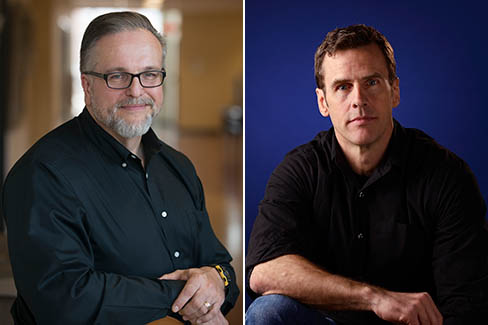
Virginia Tech Carilion Research Institute faculty members Warren Bickel and P. Read Montague were appointed as endowed professors this week by the Virginia Tech Board of Visitors.
The board honored Bickel, professor and director of the Addiction Recovery Research Center, by naming him the first Virginia Tech Carilion Behavioral Health Research Professor, and honored Montague, professor and director of the Human Neuroimaging Laboratory, by naming him the first Virginia Tech Carilion Vernon Mountcastle Research Professor.
Warren Bickel
“Dr. Bickel is an extraordinary individual. He has taken on one of the greatest societal problems of our lifetime — substance abuse and addiction — and brought the sciences of behavior, computation, economics, and neuroscience together to converge on a potentially unifying theory that may explain a wide range of dysfunctional behaviors that have immense health consequences and cost to society,” said Michael Friedlander, Virginia Tech’s vice president for health sciences and technology and the institute’s executive director.
Bickel has made seminal discoveries on how the human brain makes decisions to abuse substances that can lead to addiction. His work on how the brain values and discounts future events is recognized throughout the scientific and medical communities as a key component of addictive behavior.
He has primarily worked in the arena of substance abuse and addiction, but Bickel has also extended the principles and relationships that he discovered to a wider variety of health behaviors, such as compliance with medical advice, exercise, eating, and risky behaviors.
This research has lead to the hypothesis that excessive discounting of the future may actually be a trans disease process, reaching across multiple dimensions of human health. Bickel has established a variety of large scale research programs in Roanoke at the research institute including the International Quit & Recovery Registry – a worldwide program that seeks to characterize for the first time common traits of individuals across the world who have been able to successfully overcome any type of addiction. This program has received considerable attention and support from the National Institute of Drug Abuse at NIH.
“Dr. Bickel has not been content to limit his work to classic studies of substance abuse but has extended his approach and developed significant collaborations to begin to address a wide range of health behaviors,” Friedlander said.
P. Read Montague
The name for the professorship comes from Vernon B. Mountcastle, who is often called the father of modern neuroscience. He made multiple discoveries in neuroscience, including resolving the details of the brain’s functional pathways for sensory processing. Mountcastle’s work was recognized with several of the most prestigious awards and honors from the scientific community, including the Lasker Award for his breakthrough in understanding how the brain’s cerebral cortex is functionally organized into columns. He was also awarded the National Medal of Science, and he received several honorary degrees, including one from Roanoke College.
“Dr. Montague’s work is of the magnitude of Dr. Mountcastle’s — truly transformational and certain to leave its mark on the world and future generations,” Friedlander said. “Read Montague is one of the most innovative modern pioneers in computational and cognitive neuroscience. His work is changing the world by addressing fundamental problems and challenges in human brain health and behavior in way not even imaginable just a decade ago.”
Montague’s research combines computational models, mathematical analysis, experimental neurobiology, and quantitative behavioral testing to transcend levels of inquiry about the human brain and behavior at multiple scales. His work has provided fundamental foundational information about how the brain computes, predicts, and makes decisions both individually and also in social context under normal conditions, as well as under a variety of neuropsychiatric disorders.
Montague is credited with several research achievements, including the discovery of the brain’s prediction error reward signals, the invention of technology that allows real-time interactive functional brain imaging on a world-wide scale, and the invention and implementation of technology that precisely measures the release of key chemical neurotransmitters in the brains of living patients with disorders such as Parkinson’s disease. Montague also established an entirely new field of science—computational psychiatry.
Friedlander also added that the connections between Mountcastle and his family with Roanoke are particularly propitious. Mountcastle lived in Roanoke as a child and attended Roanoke College before completing his medical training at Johns Hopkins, where he served on the faculty for more than 60 years before his death in 2015.
“We are very grateful to the Mountcastle family for allowing the name to be used for this important professorship,” Friedlander said.

